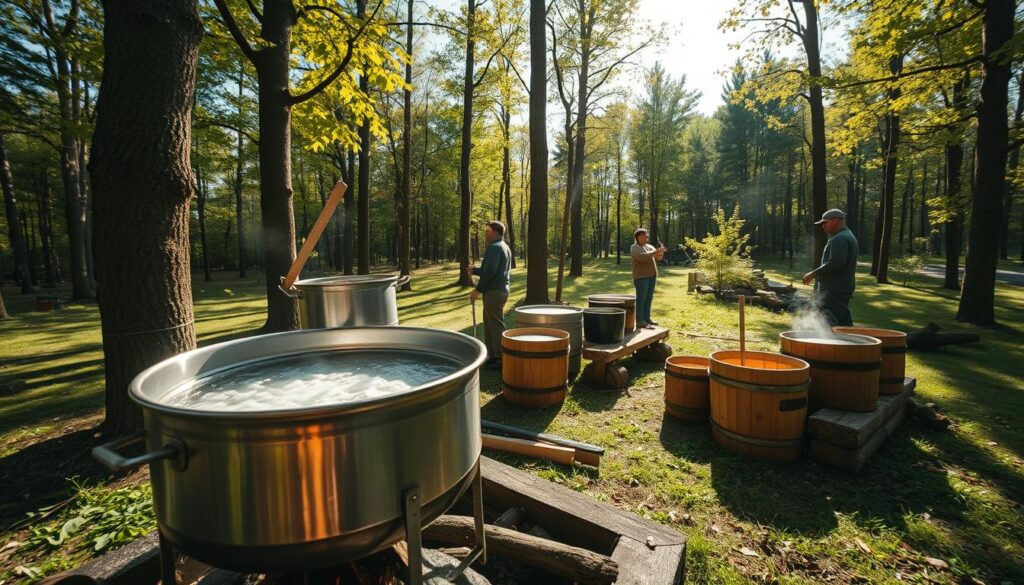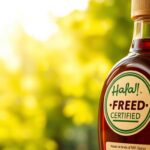Exploring maple syrup can change how you cook. It’s a natural sweetener that connects us to forest traditions. This golden liquid comes from maple trees without harming animals.
Vegan maple syrup shows nature’s power to make tasty sweeteners without hurting creatures. Sugarmakers tap maple trees at the right time. They boil the sap to make syrup. This method is plant-based, perfect for those who care about animal welfare.
Learning about maple syrup starts with its unique taste. It’s different from processed sugars or fake sweeteners. Each drop is carefully made, caring for the environment and our health.
Maple syrup’s beauty is in its simplicity. It comes from maple trees in places like Vermont and Quebec. It’s not just sweet; it’s full of minerals, antioxidants, and a rich history.
If you’re vegan, health-focused, or just trying plant-based foods, maple syrup is great. It’s good for breakfast or fancy dishes. It shows that eating ethically can be tasty and fulfilling.
Understanding What Makes Maple Syrup Is Vegan
Maple syrup is a unique plant-based sweetener that connects us to nature’s pure goodness. It goes from tree to table with minimal processing and no animal involvement. This makes it a perfect vegan-friendly condiment.
The process of making maple syrup starts with the bond between maple trees and sugarmakers. These experts tap into the trees with methods that respect the tree’s health.
Natural Extraction Process
Maple syrup production is simple and keeps the tree healthy. Sugarmakers drill holes in the trees in late winter or early spring. This lets sap flow out naturally, without harming the tree or using animal products.
- Sustainable tapping techniques
- Minimal invasive procedures
- Seasonal collection methods
Tree-to-Table Journey
Turning raw sap into syrup is a straightforward process. Sugarmakers boil the sap until it thickens into syrup. No chemical additives or animal products are used in this process.
Complete Absence of Animal Products
Maple syrup is a pure, plant-based sweetener from start to finish. Unlike other sweeteners, it doesn’t use animal products. It’s made just with tree sap and heat, creating its unique flavor.
- 100% plant-derived
- No animal by-products
- Entirely natural processing
The Traditional Maple Syrup Production Method
The art of making vegan maple syrup is a tradition in North America. It starts with a special connection between sugarmakers and maple trees in late winter and early spring.
The process has several key steps:
- Tree Selection: Mature maple trees aged 40-100 years are chosen for tapping
- Careful Drilling: Small holes are precisely drilled into tree trunks
- Sap Collection: Clean tubes or traditional buckets collect raw tree sap
- Boiling Transformation: Sap is carefully heated to concentrate its natural sweetness
Sugarmakers need patience and skill to collect maple sap. The magical window for sap flow happens when it’s cold at night and warm during the day. This usually is from February to March.
A single maple tree can produce approximately 10-20 gallons of sap per season, which reduces to just one quart of pure maple syrup.
This way of making maple syrup is good for the forest. Native communities started these methods, sharing their knowledge for generations. Today, vegan maple syrup makers follow these old ways. They make sure to protect the environment while creating a natural, pure product.
Why Pure Maple Syrup Is a Perfect Plant-Based Sweetener
Maple syrup is a standout plant-based sweetener. It’s not just tasty; it’s also packed with health benefits and eco-friendly qualities. It’s a great choice for those who prefer natural, vegan-friendly options.
Natural Sugar Content and Composition
Pure maple syrup has a unique mix of natural sugars. This makes it a better choice than refined sugars. It’s sweeter but with less processing.
- Sucrose (primary sugar)
- Glucose
- Fructose
Mineral and Antioxidant Powerhouse
Maple syrup is more than just sweet. It’s full of minerals and antioxidants. These help keep your body healthy.
| Mineral | Quantity per 100g |
|---|---|
| Manganese | 22% Daily Value |
| Zinc | 7% Daily Value |
| Calcium | 5% Daily Value |
Environmental Sustainability
Choosing maple syrup helps the environment. It supports sustainable farming and keeps forests healthy. This method is kind to our planet.
- Minimal carbon footprint
- Supports forest conservation
- Regenerative agricultural practice
By picking pure maple syrup, you’re making a choice that’s good for you and the planet.
Distinguishing Real Maple Syrup from Non-Vegan Alternatives
Finding vegan maple syrup can be hard for those looking for real dairy-free syrup. Not all syrups are the same. Knowing how to spot true maple syrup is key for those eating plant-based.
When looking for vegan maple syrup, check the labels and ingredients closely. Real maple syrup has just one thing: pure maple syrup from maple tree sap. Fake alternatives might have:
- Corn syrup
- High fructose sweeteners
- Artificial flavors
- Chemical preservatives
Signs of real vegan maple syrup include:
- Single ingredient listing – pure maple syrup should only list maple syrup
- USDA organic certification
- Transparent bottling showing natural color variations
- Clear indication of maple syrup grade
Sugarmakers make dairy-free syrup by collecting maple tree sap and boiling it down. This traditional way makes a 100% plant-based product that vegans can enjoy.
“Real maple syrup is nature’s purest sweetener – nothing added, nothing removed.”
Be careful of terms like “pancake syrup” or “maple-flavored syrup.” They usually mean a product with animal ingredients or fake additives.
Nutritional Benefits of Pure Maple Syrup for Vegans
Vegan maple syrup is a standout plant-based sweetener. It’s not just tasty; it’s also packed with nutrients. This natural sweetener is a great choice for those on a plant-based diet, beating out refined sugars.
Essential Minerals and Vitamins
Pure maple syrup is a nutritional powerhouse. It’s full of minerals that are good for your health:
- Manganese: Supports bone health and metabolism
- Zinc: Boosts immune system function
- Calcium: Promotes strong bones and teeth
- Potassium: Helps regulate heart and muscle function
Antioxidant Powerhouse
Vegan maple syrup is loaded with antioxidants. These compounds protect cells from harm. Studies show it has up to 24 different antioxidants, which fight inflammation and boost wellness.
“Maple syrup isn’t just a sweetener – it’s a natural source of health-promoting compounds.” – Nutrition Experts
Caloric Content and Sugar Levels
Maple syrup is a natural sweetener, but it should be used wisely. One tablespoon has about 52 calories and 13 grams of sugar. It’s a better choice than refined sugars because it’s more nutritious.
Adding vegan maple syrup to your diet can add flavor and nutrition. It’s a healthy way to sweeten your food.
Sustainable Harvesting Practices in Maple Syrup Production
Ethically sourced maple syrup is a top example of sustainable farming. Making maple syrup is more than just tapping trees. It’s a mix of caring for the environment and keeping old traditions alive.
Sugarmakers use new methods to harm forests less. They focus on several important steps:
- Choosing trees carefully to avoid over-tapping
- Rotating tap spots to let trees heal
- Using modern, gentle tapping tools
- Keeping forests diverse
The old way of making maple syrup helps protect forests. Maple forests managed for syrup become safe havens. They keep forests from being cut down and protect important animal homes.
“Every drop of maple syrup tells a story of environmental respect and traditional craftsmanship.” – Maple Forest Conservation Society
Producing sustainable sweetener is a detailed process that keeps trees and forests healthy. Sugarmakers only tap trees that are over 40 years old. This helps the forest stay strong and keep producing for years.
New ways to collect sap use vacuum systems and special tubes. These methods lower stress on trees and make more syrup. They show how old farming ways can grow with care for the planet.
Different Grades of Vegan Maple Syrup Explained
Learning about vegan maple syrup grades helps you pick the right sweetener for your recipes. The grading system shows the flavor, color, and uses of this natural sweetener.
Maple syrup grades are based on light transmission and flavor. Each grade has special traits for different cooking and baking needs.
Grade A Light Amber
Grade A Light Amber has a light and subtle taste. Sugarmakers make this grade early in the season. It’s a pale golden color and mild. It’s great for:
- Drizzling over pancakes
- Sweetening tea or coffee
- Delicate baking recipes
Grade A Medium Amber
As the season goes on, the syrup gets richer. Grade A Medium Amber has a stronger maple taste. It’s perfect for:
- Baking cookies and muffins
- Glazing roasted vegetables
- Marinades and salad dressings
Grade A Dark Amber
Dark Amber syrup is harvested later. It has a strong and intense flavor. It’s great for:
- Barbecue sauces
- Hearty baking recipes
- Bold dessert preparations
“The beauty of maple syrup lies in its versatility and natural origins,” says a traditional sugarmaker from Vermont.
All pure maple syrups are 100% vegan. They are a natural choice instead of refined sweeteners.
How to Store and Preserve Your Vegan Maple Syrup
Storing your vegan maple syrup right is key to keeping its quality. Fans of dairy-free syrup know that storing it well keeps its flavor and health benefits.
Temperature is very important for storing vegan maple syrup. Keep unopened bottles in a cool, dark spot. Once opened, put it in the fridge to stop it from spoiling and keep it perfect.
- Store unopened vegan maple syrup in a cool, dark place
- Refrigerate after opening to extend shelf life
- Use airtight containers to prevent contamination
- Keep away from direct sunlight and heat sources
Crystallization is a worry for maple syrup fans. Pro tip: If your syrup starts to crystallize, warm it gently in a water bath. This will make it smooth again.
| Storage Location | Unopened Shelf Life | Opened Refrigerated Shelf Life |
|---|---|---|
| Pantry | 1-2 years | N/A |
| Refrigerator | Indefinite | 6-12 months |
Look out for signs of spoilage in your vegan maple syrup. Mold, bad smells, or color changes mean it’s time to throw it away. When stored right, pure maple syrup stays great for months. It’s a tasty, natural sweetener for your favorite foods.
Creative Ways to Use Maple Syrup in Vegan Cooking
Maple syrup is a versatile sweetener that makes vegan recipes special. It adds a rich flavor that goes beyond just drizzling. It offers endless ways to make plant-based dishes stand out.
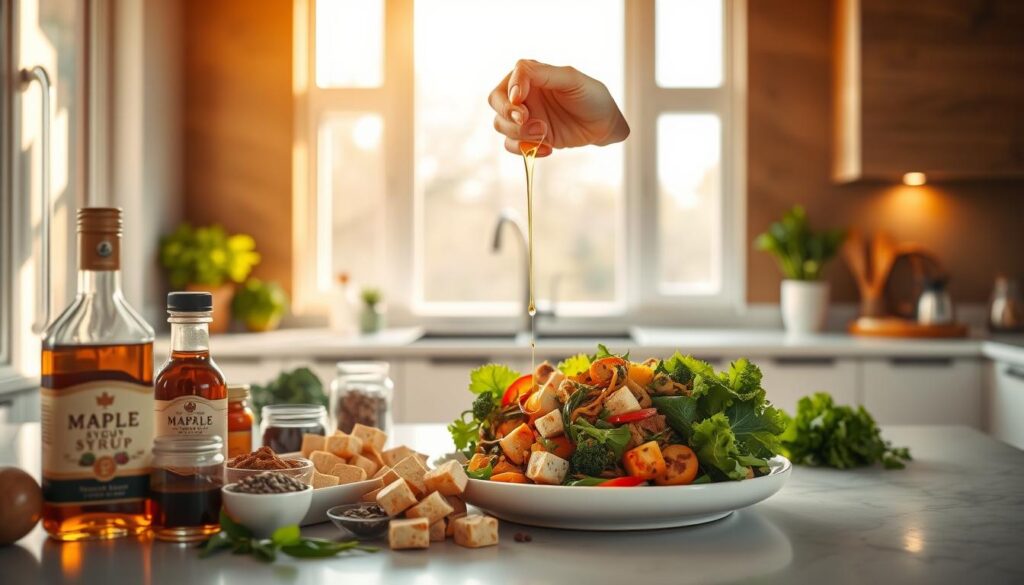
Using maple syrup in vegan recipes can change how you cook. It’s a natural sweetener that brings depth and complexity to many dishes.
Baking Magic with Maple Syrup
Maple syrup is great for vegan baking. It replaces traditional sweeteners with its unique taste. You can use it in:
- Banana bread
- Vegan muffins
- Cookies and brownies
- Fruit crumbles
Breakfast Innovations
Make breakfasts special with maple syrup. It’s perfect for:
- Maple-glazed vegan pancakes
- Overnight oats with maple drizzle
- Chia seed puddings
- Smoothie bowls
Unexpected Savory Delights
Maple syrup isn’t just for sweets. It’s also great for savory dishes. Chefs can use it in:
| Dish Category | Maple Syrup Application |
|---|---|
| Roasted Vegetables | Maple glaze for carrots, Brussels sprouts |
| Marinades | Base for tofu and tempeh glazes |
| Salad Dressings | Maple-mustard vinaigrette |
Trying maple syrup in cooking can lead to amazing creations. It’s a key ingredient for those who love plant-based cooking.
Common Misconceptions About Maple Syrup’s Vegan Status
Maple syrup is a vegan-friendly condiment that often faces many misunderstandings. Many people believe wrong things about how it’s made and what it’s made of. This can confuse those who eat only plants.
Let’s look at some common myths about maple syrup’s vegan status:
- Myth: Maple syrup involves animal products in its production
- Myth: Bees are harmed during maple syrup extraction
- Myth: Commercial processing makes maple syrup non-vegan
The truth about Maple Syrup Is Vegan is far from these myths. Its making is all about plants, using only tree sap and boiling it carefully.
“Pure maple syrup represents one of the most natural and unadulterated sweeteners available in nature.” – Maple Syrup Producers Association
Sugarmakers tap maple trees carefully, taking sap without hurting the trees. The whole process is natural, respecting plants and the environment.
| Misconception | Actual Fact |
|---|---|
| Animal products used | 100% plant-based extraction |
| Bee involvement | No bee interaction in production |
| Chemical processing | Natural boiling and filtering |
Vegans can enjoy maple syrup without worry. Knowing how it’s made clears up any doubts about its plant-based nature.
Environmental Impact of Choosing Maple Syrup as a Sweetener
Maple syrup is a top choice for those who care about the planet. It’s made in a way that keeps forests healthy. This makes maple syrup a great pick for those who want to help the environment.
Carbon Footprint Considerations
Maple syrup has a much smaller carbon footprint than other sweeteners. The way it’s made doesn’t harm the environment much. It has big benefits like:
- It needs little processing
- It uses very little energy
- It helps manage natural resources well
Forest Preservation Strategies
Maple syrup helps protect forests. Healthy maple forests become economic assets for local communities. This encourages people to keep these forests safe.
“Maple forests are living, breathing carbon sinks that contribute to global environmental health.” – Forest Ecology Research Team
Sustainable Production Methods
Today’s sugarmakers use new ways to use less resources. They use:
- Smart tapping methods
- Energy-saving boiling systems
- Water recycling in syrup making
By picking maple syrup made the right way, you help farmers who care for the land. This choice helps keep our planet healthy.
Reading Labels: Ensuring Your Maple Syrup is Truly Vegan
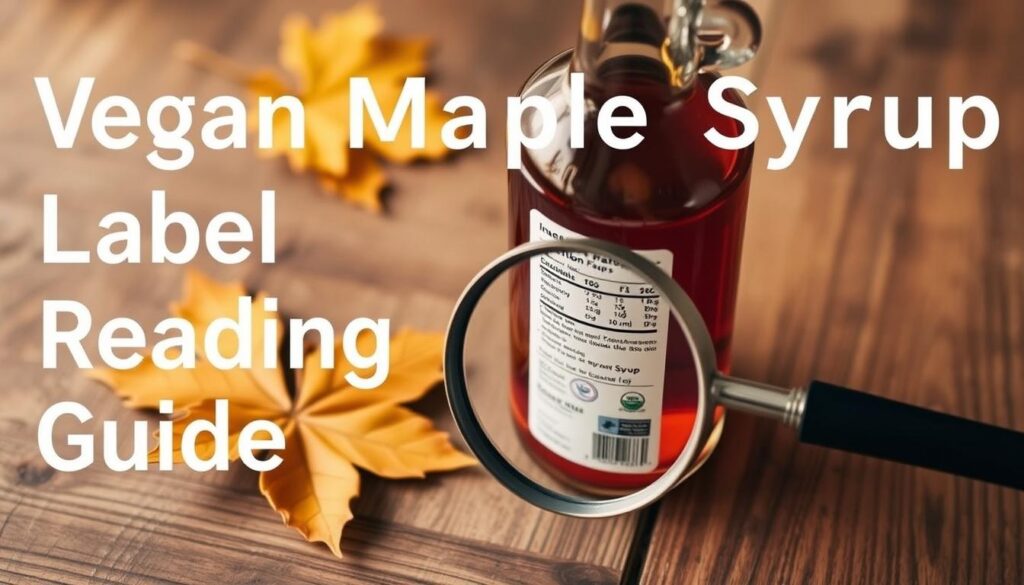
Finding vegan maple syrup can be hard. It’s important to know what to look for in a dairy-free syrup. Reading labels well helps make the right choice.
When checking vegan maple syrup labels, look for these signs:
- Make sure the list only has pure maple syrup
- Look for vegan certification logos
- Stay away from products with animal products
- Find clear info on where the syrup comes from
Watch out for these signs that might mean it’s not vegan:
- Unclear how it’s made
- Strange ingredients you don’t recognize
- No clear vegan label
Certification groups help find real vegan maple syrup. The Vegan Society and Certified Vegan are trusted by many.
“Know your food, know your source” – Vegan Nutrition Expert
| Label Indicator | Vegan Status | Action |
|---|---|---|
| Pure Maple Syrup | Typically Vegan | Safe to Purchase |
| Added Ingredients | Potential Risk | Investigate Further |
| Vegan Certification | Confirmed Vegan | Recommended |
Smart shoppers know to read labels carefully. This way, they pick a real vegan maple syrup that fits their diet and values.
Seasonal Aspects of Maple Syrup Production
Producing vegan maple syrup is a dance with nature, tied to the seasons. Sugarmakers know that sap flows only for a short time each year. This usually happens from late winter to early spring.
For the best sap collection, the weather must be just right. The sap flows best when it’s cold at night and warm during the day. This mix of temperatures makes the sap move in the trees.
- Winter months: Trees store starches in their roots
- Early spring: Starches convert to sugar
- Maple season: Typically 4-6 weeks long
Climate change is affecting maple syrup production. Warmer temperatures are making the sugaring season shorter. This makes it hard for producers to keep up with their methods.
Maple syrup’s seasonal nature makes it valuable for the environment. It’s a natural, less processed food that honors nature’s cycles. This is different from industrial sweeteners.
Maple syrup production is nature’s own artisanal sweetener-making process.
Places like Vermont, New York, and Quebec are great for making maple syrup. Their cold winters and mild springs are perfect for this special farming practice.
Price Comparison: Maple Syrup vs Other Vegan Sweeteners
Choosing the right plant-based sweetener is important. You need to think about cost, nutrition, and long-term benefits. Vegan maple syrup is a top choice because it’s affordable and healthy.
Maple syrup costs more at first, but it’s worth it. It has a strong flavor and lots of nutrients. This makes it a great choice for those who care about health and taste.
Cost per Serving Analysis
- Pure maple syrup typically ranges from $0.50 to $1.00 per serving
- Agave nectar averages $0.40 to $0.75 per serving
- Honey alternatives cost approximately $0.45 to $0.85 per serving
Value Comparison
Vegan maple syrup is more than just a sweetener. It’s packed with minerals and antioxidants. Just one tablespoon gives you a lot of health benefits, making it a smart choice.
Long-term Economic Benefits
Buying high-quality maple syrup helps the environment and your health. It’s made naturally, so it’s good for the planet and you.
“Quality ingredients are an investment in your health and the planet’s well-being.” – Sustainable Food Experts
Best Brands of Ethically Sourced Vegan Maple Syrup
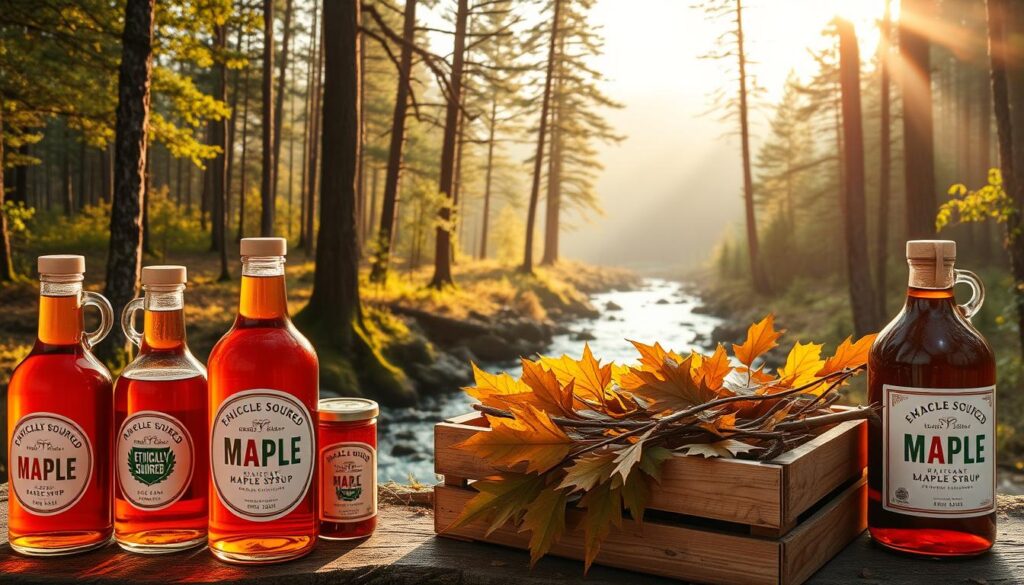
Choosing the right maple syrup can change how you cook. There are many vegan-friendly options that are made sustainably and are of high quality.
For those who love maple syrup, there are many premium brands to pick from. Each brand offers something special:
- Maple Holistics – Known for organic, small-batch production
- Butternut Mountain Farm – Sustainable Vermont producer
- Coombs Family Farms – Pioneering regenerative agricultural practices
- Crown Maple – Certified organic with advanced filtration techniques
People who care about the environment look for brands that are open about where they get their ingredients. Here’s a comparison of some key points:
| Brand | Sustainability Rating | Price Range | Certification |
|---|---|---|---|
| Maple Holistics | Excellent | $12-$18 | USDA Organic |
| Butternut Mountain Farm | Very Good | $10-$15 | Non-GMO Project |
| Coombs Family Farms | Outstanding | $15-$22 | Fair Trade |
| Crown Maple | Exceptional | $18-$25 | USDA Organic |
Pro tip: Look for brands that provide detailed information about their maple syrup’s origin and production methods to ensure you’re selecting a truly ethical product.
“The best maple syrup tells a story of respect for nature and traditional craftsmanship.” – Sustainable Food Institute
Conclusion
Maple syrup is more than just a sweetener. It’s a story of sustainable production that fits well with vegan lifestyles. The process, from tapping maple trees to minimal processing, shows a care for the environment and ethics in food.
Maple Syrup Is Vegan is not just a tasty choice. It helps forests, gives important nutrients, and supports plant-based eating. The path from forest to table shows a great balance between enjoying food and protecting nature.
Vegans and health lovers can trust maple syrup. It’s pure, full of minerals, and great for cooking. Choosing maple syrup helps farming that cares for the earth and gives a food that’s good for you and nature.
As we learn more about eating mindfully, maple syrup is a symbol of good eating. It’s perfect for breakfast, baking, or savory dishes. This amazing sweetener encourages us to eat in a way that’s kind to the planet and ourselves.

